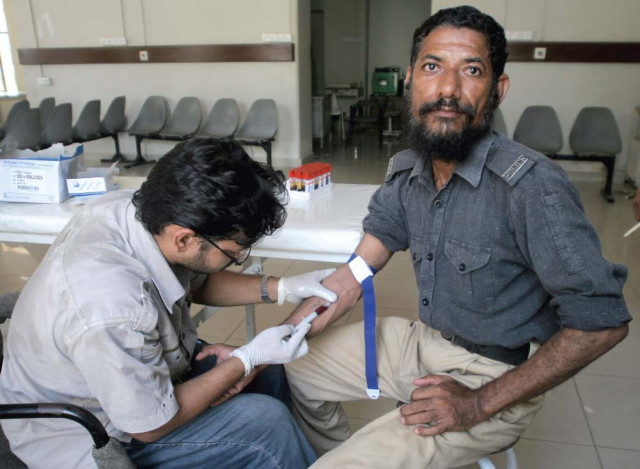World Hepatitis Day: Going viral
In the wake of an epidemic of viral hepatitis, more needs to be done to save more lives from being lost in Pakistan.

In the wake of an epidemic of viral hepatitis, more needs to be done to save more lives from being lost in Pakistan. PHOTOS: EXPRESS/FILE
She looks weak and exhausted. Pregnant with her second child, Sonia Bibi, a resident of Chuadhrian ka Mohalla, Bhara Kahu, is a patient of hepatitis C. “I am not worried for myself but about my baby. I don’t know whether I will be able to give birth or raise my baby as I am scared that I will die soon,” she said.
Her fear is not unfounded. More than seven of her close relatives living in the same area have suffered from hepatitis C. Five of them died. “Some of my relatives who could not afford to travel to Islamabad for the treatment went to the nearby doctors but their condition instead of improving worsened,” she said, talking about those who lost the battle against this life-threatening disease.
Given the contagious and viral nature of both hepatitis B and C, it is no surprise that these diseases tend to spread more in areas where they are left unchecked. Bhara Kahu is one such place, as revealed by Dr Jan Alam who earlier used to work at polyclinic Hospital and now is running his private hospital in Bhara Kahu. “Bhara Kahu has become a hub of hepatitis C,” he said. In his opinion, the main reason for this is the mushroom growth of quacks in the area who have opened their ‘mini clinics’ and are using expired syringes.
Pakistan’s epidemic
According to World Health Organisation (WHO), Pakistan is currently facing an epidemic of viral hepatitis in the country with national prevalence of hepatitis B at 2.4% and of hepatitis C at 4.9 %.
Viral hepatitis often causes cirrhosis and liver cancer and is a potentially fatal disease.
Currently, there are an estimated 16 million persons infected with this disease in the country and the main reasons for the spread of this disease are frequent use of therapeutic injections, re-using used syringes, inappropriate sterilisation practices and inappropriate hospital waste management system.
The ‘quack’ factor
The Pakistan Medical Dental Council (PMDC) had launched an extensive campaign to curb quackery in the perspective of communicable diseases like hepatitis, said their spokesperson Jumma Mandokhel.
“However, the campaign did not manage to get success due to the presence of homeopaths and other quacks practicing medicine despite no licenses and qualification. Moreover, there has been no proper legislation at the national level to curb the menace of quackery,” he said.
He said the media has been a big reason in boosting the menace of quackery through maligned advertisements. “Both electronic and print media has been publishing advertisements of quacks without proper authentication of degrees and qualifications. PMDC has recently written a letter to the Pakistan Electronic Media Regulatory Authority, All Pakistan Newspapers Society and Press Information Department to assist in curbing the menace of quackery but to no avail as the quoted department claimed to have no legislation in this regard and cannot do much until proper legislation is done,” he said.
Not enough being done
An official in the ministry of national health services, regulations & coordination (MNHSRC), who wished not to be named, said that after the devolution of health ministry under the 18th Amendment, the prime minister’s Programme for Prevention and Control of Hepatitis suffered the most.
The public hospitals stopped providing treatment to its patients due to which many, who were under or seeking treatment suffered a lot, said the official.
“Hepatitis is increasing in the country at an alarming rate but unfortunately the government is not paying much heed to it. Currently, there is no programme on hepatitis at the federal level, due to which nothing is being done for its control or prevention,” said the official.
The hepatitis programme may have recently come under the MNHSRC, but the impact is limited to documents and papers.
“The permanent solution is to work on root causes such as quacks, use of unsterilised surgical equipments, re-used syringes and unsafe blood transfusions among others,” said the official.
Published in The Express Tribune, July 28th, 2013.



















COMMENTS
Comments are moderated and generally will be posted if they are on-topic and not abusive.
For more information, please see our Comments FAQ